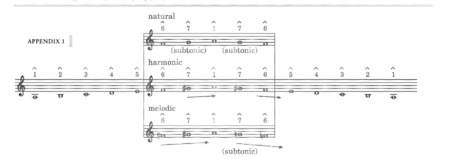A diatonic collection is a collection of 7 notes where each letter (A..G) is used exactly once.1
A scale is a stepwise ordering of a diatonic collection.
The tonic is the most prominent pitch in a scale. Playing the tonic gives a sense of resolution and subjectively is the best note for the end of a song/rift.
The full list of of the names of scale degrees in a major scale are:
1st degree = tonic
2nd degree = supertonic
3rd degree = mediant
4th degree = subdominant
5th degree = dominant
6th degree = submediant
7th degree = leading tone
A minor scale in its natural form contains the following intervals:
W,H,W,W,H,W,W2
Note that a minor scale is also the aeolian mode of a relative major scale.
Because the 7th degree in the natural minor scale is no longer a semitone away from the tonic, the 7th degree is referred to as the subtonic instead of the leading tone.
The two other forms of the minor scale are the harmonic and the melodic.
The harmonic minor scale raises the 7th degree so it is once again a "leading tone." Its intervals are:
W,H,W,W,H,W+H,H
The melodic minor scale raises both the 6th and 7th degree one semitone to form the following interval pattern:
W,H,W,W,W,W,H
However when one descends the melodic minor scale one returns the 6th and 7th degree to their natural position.
A staff displaying the three forms of the A minor scale3:
- The convenience of being able to have a diatonic collection where, given the context, each note can be specified with only a letter is the reason for the existence of enharmonically equivalent pitches - i.e. two pitches with the same frequency but different name such as A# and Bb. [↩]
- A "W" is a whole step i.e. two semitones, an "H" is a half step i.e. one semitone. To go up a semitone one increases the frequency of the previous tone by the twelfth root of 2. [↩]
- Taken from The Complete Musician by Laitz. [↩]

Now that you've studied music theory - are you ready to admit that Russ isint a real rapper? (I've been holding on to that one for a while)
aha
My high school music appreciation teacher once said: pop/rap : music as mcdonalds : food - You can enjoy it every once in a while as long as you know it is shit.
I don't agree with her though; you should never eat at mcdonalds. But the fatlogic is quite a mountain to climb over.
Yo, rap ain't music, it's just the sincerest attempt to poetry these last few decades could give!
You can go deeper with your definition: the tonic/root is first and foremost a musical frame of reference, the other notes in the scale proceeding from it and being centered around it. The "sense of resolution" is indeed an interesting (and scarcely understood) psychological aspect, and the whole Western musical algebra was conceived to capture (among others) this figment of reality.
@spyked
Thanks for the better definition.
The phenomenon with the psychological effect of the tonic is beautiful and mysterious. It is also beautiful how western music is based off of only a few primitives (such as the major and minor scale and the 12 classes of pitches.)
Quite! Even even though the Western system has gone through its own rollercoaster rides; the whole temperament discussion is the first that comes to mind.
Also, it's fascinating that simpler scales are more easily recognizable by... everyone, basically. I remember that Bobby McFerrin video in which he discusses "the power" of the pentatonic scale. I would have rather said "its universality", it's fascinating how you can find it in almost all places around the globe.
[...] I guess this is as good a way as any to re-inaugurate the "music" category... since I've found a (perhaps very short) context to express some ideas on the subject. Somewhere else, I said: [...]